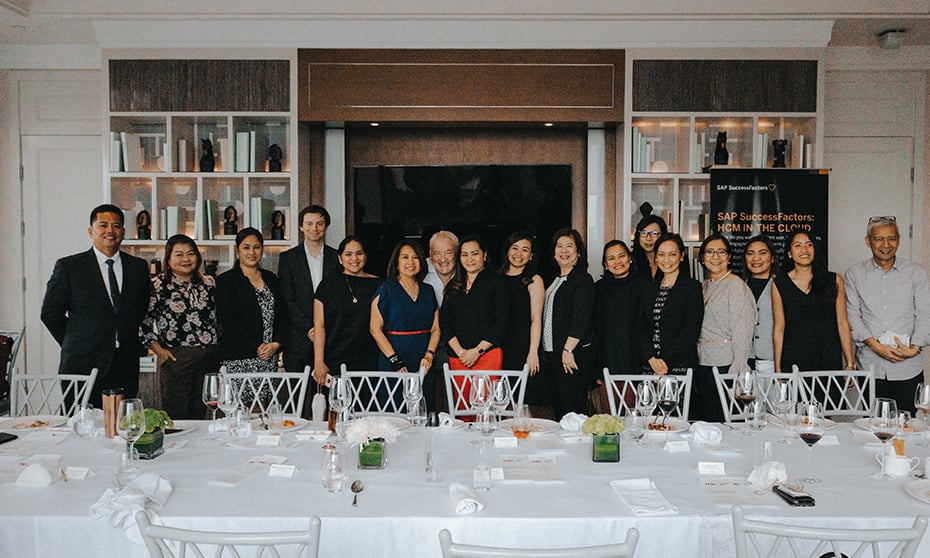
Leading HR professionals gathered at the SAP SuccessFactors executive roundtable in Manila to discuss how to deliver exceptional employee experience

A rising number of innovative organisations are finding that exceptional customer service and a purpose-driven workforce go hand in hand.
And it’s HR leaders who must play the essential role of driving people-oriented programs across all functions to ride the wave of the experience economy.
However, research by Deloitte has found many companies have not yet made employee experience a priority for HR leaders, often delegating this problem to an annual engagement survey.

Even though some companies have created the C-suite role of employee experience officer, most companies have not assigned responsibility to a senior executive or team to design and deliver the employee experience.
The research also found companies need to update their tools to engage employees on an ongoing basis (with pulse surveys at least) to help HR teams and line leaders understand what the talent they employ expects and values.
At the Mirèio Restaurant in Manila, global HR leaders gathered at the SAP SuccessFactors roundtable to discuss the latest employee experience trends and the mechanisms to deliver exceptional service for the “moments that matter”.

The lunchtime discussion was moderated by Shine Rodriguez, HR Director at AXA Philippines. Rodriguez opened by saying that day in day out, HR professionals are responsible for thinking about strategies to improve the employee experience.
The lead speaker was Joni Ferrier, Director HR Strategy & Transformation at SAP. Ferrier agreed that it’s high time for HR to take ownership of delivering a great employee experience and that it must prioritise leadership development.
“It is HR who creates the policies and programs for choosing and preparing the leaders of the organisation,” said Ferrier.
“In the past, many organisations have opted to choose leaders because they are very good technically.
“As HR leaders, we have to make sure that we embed in our decision making that the leaders are not just technically gifted, but can really lead, empower and inspire people.”
Ferrier added that “your culture is reflected in every moment that matters to employees” and if you are looking at these moments the first touchpoint for employees is their leaders.
“When they come in as a candidate they talk to HR, but after that they talk to the leader that manages them. Preparing the leader to have the right discussion is key to providing a positive employee experience,” she said.

“The onboarding experience is about how workers prepare to be productive within the organisation. Who is there for them to do that? Your team. And what kind of team you have is based on the culture that your leader has embedded in the organisation.”
The roundtable also looked at the importance of leaders having the right information and guidance to be able to impact the employee experience.
Looking at the onboarding experience, imagine having everything you need right from day one. For example, being able to access a specific laptop or being informed when exactly you are paid.
“This is what technology can do for us. It means that your employees can be productive,” said Ferrier.
“One of the things that employees long for is to make an impact right from the outset. We are always so excited on day one. What can I do to prove myself? How do I impress people to make a contribution to the organisation?”

Most of us join an organisation to feel like we are contributing something meaningful and to deliver results. So if we provide them with the right technology and that allows them to excel then that’s one part of the battle, said Ferrier.
“However, the second half is really about the culture of the organisation. This is where it’s important to always be listening to your employees,” she added.
“In HR, we deliver programs and our employees give us feedback on that. It’s important to do that not at the end of the year, but at every moment that matters.
“Unless we listen to them we can’t give them exactly what they want.”

According to Ferrier, listening is about elevating the experience of employee – “making them feel that every day that they are important to us”.
“We have to be able to provide that data to our leaders because it forces them to take action and it makes them a better leader - they are listening to their employees,” she said.
“There are technologies that will just give you the information, and will also provide you with recommendations and actions you can take.
“That is going to be so much more powerful because that recommendation will give you the first steps to significantly elevate the employee experience.”